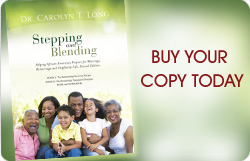


In addition to being available for conferences related to the materials in Stepping and Blending ...Dr. Long is available to present a variety of workshops and seminars. Such titles included...
Protecting the Children by Reducing the Risk
The children of America are our country’s most precious resource. The future hope of this nation rests upon their development and potential. Physical and sexual abuse endangers that future and shatters the innocence and purity of childhood.
Child sexual abuse robs children of their innocence and dignity. It steals from them their chances of a healthy emotional and sexual development. It robs them of trust in those they respect, and if this abuse occurs in the church, it could rob them of their faith in God.
Child sexual abuse or molestation occurs whenever an adult has sexual activity with a minor or youth. Sexual abuse creates emotional and confusion in its victims. It is always wrong and the young person is always the victim. In every state it is illegal and criminal.
Child sexual abuse is at epidemic levels. One in four families are affected by child sexual abuse. In over 80%, (some statistics say 89%), of these tragic situations, someone they know and trust will have abused them. Although the majority of this abuse occurs within the home, over 30% of cases involve adults in day care, sporting, educational, and, yes, religious programs such as churches.
African American children are abused just as often as white children, and while this is true, survivors report different reactions to their experiences. The history of slavery and oppression in the African American community further impacts the secrecy behind sexual abuse, which impacts the statistics, and also allows sexual abuse to continue.
You might say, “This could never happen in our church.” It might seem almost impossible that such a heinous activity could taint your community of faith. But it can. Incidents of child sexual abuse cut across every racial, social, economic, and religious boundary. A rule of thumb to remember: “If your church has children, your church is at risk.” One allegation of sexual abuse in your church can devastate an individual, a family, and can divide and destroy the ministry of your church.
Download PDF Reducing the Risk
“On a Pill and a Prayer” – Understanding Depression
Fact: “Depressive Disorders affect approximately 18.8 million American adults in any given year, or about 9.5% of the population. Even among our youth, the increase of depression - rate of 23% over the past year is alarming” (Christian Counseling Today, Vol. 16, No. 2, 2009, p.8).
This workshop answers the questions: What is depression? What are the statistics regarding depression? How is depression different for various ethnic groups? What causes depression? What are the symptoms of depression? What are the types of depression? How does depression manifest itself in men, in women, in children, in teens, in seniors? Can a Christian be depressed, and if they can be, does it mean they are in sin? Are there examples in the Bible of persons who became depressed? How is depression treated? Where to get treatment?
Download PDF On a Pill and a Prayer
“Be Anxious For Nothing . . .” Understanding Anxiety
Fact: “Anxiety disorders represent the most common mental illness in the United States today – impacting more than 40 million adults or 18.1% of the population” (Christian Counseling Today, Vol. 16, No. 2, 2009, p. 9).
This workshop answers the questions: What are anxiety disorders? How does anxiety manifest itself? What are the symptoms, the different types of anxiety disorders? What causes anxiety? Does anxiety impact ones ability to live a faith filled life? Is anxiety evidence of sin in one’s life? How is anxiety treated? Where to get treatment?
Download PDF Be Anxious for Nothing
The Suicidal Saint: Recognizing and Responding
Fact: The National Institute of Mental Health statistics indicate that more than 32,000 deaths occur every year due to suicide, making it the 11th leading cause of death in the United States, which translates into a suicide every 16 minutes (Christian Counseling Today, Vol. 16, No. 2, 2009, p. 53-54).
The learning objectives of this workshop are to help church leaders to be able to recognize the potentially suicidal saint and to respond appropriately to that person. Secondary objectives include: to heighten awareness; examine attitudes, desensitize for dialogue about this taboo subject, equip with the tools to recognize and respond and understand the facts, statistics, nature, scope and prevalence of suicide in our society in general, and specifically for African Americans who have a tremendous rise in the rate of suicide in recent years, but who remain in denial, while many inside and outside of the church suicide themselves.
“What are the Losses You Have Never Grieved?” - Loss and Grief
Attachment is inevitable because we are made for connection. Loss is inevitable when there is a break in our attachment to a person, place, thing, idea, dream, etc. Grief is inevitable when there is loss whether we acknowledge it and express it or not.
The purpose of the workshop is to: (1) help one understand the problem, process, and paradox of loss and grief, and to see it as a natural part of life; (2) to help one acknowledge and begin to talk about the losses in our lives as a way to help us face the future in a more Christ - honoring way; (3) to recognize loss for what it is, and how to deal with feelings of depression, anxiety, hurt and anger that loss generates; (4) to recognize the symptoms of unresolved grief, and how it can hinder one from a normal recovery process; and (5) to find ways to cope with, and grow through our losses, especially for those who have experienced multiple losses, with special help for grieving children and teens.
Fact: Sexual Abuse: Recognizing the Effects and Responding to the Victims
Sexual abuse is at epidemic proportions in our society, affecting 1 in 3 girls and 1 in 6 boys by the age 18.
The purpose of this workshop is to define sexual abuse, the symptoms – physical, behavioral, verbal and emotional - the immediate and long-term impact or effects of sexual abuse on the victim, the church and the larger society. It defines types of abusers, examines the legal environment and their response to the rise in sexual abuse; explores why churches are getting sued, and the church’s liability should a child be abused while in the care of the church. It addresses what children need to know before and after abuse, and examines the Scripture’s handling of childhood sexual abuse.
This workshop also includes a version that is developed and presented just for teenagers. This workshop differs from the Reducing the Risk by Protecting the Children workshop in that this one is designed to provide general information on the subject to a collective congregation. The former one is designed for pastors and church leaders and for those who will be ministering to children and youth.
Are You Really “Too Blessed To Be Stressed?”
Stress is a part of life. Stress is not sin. Jesus himself faced so much stress in the Garden of Gethsemane that "his sweat was like drops of blood falling to the ground." Luke 22: 44. Stress affects every area of our being and is affected by every area. Stress will happen. The question is: What will you do with it? This is where we could make sinful choicesor we can make righteous choices like managing our stress in healthy, God-honoring ways.
The objectives of this workshop are (1) to define stress and examine the chemistry of stress and its affect upon our bodies, brain and spirit; (2) to explore the causes of stress, the environment of stress, the indicators of stress overload; the maladaptive ways many cope with stress at work and at home, and (3) to instruct on ways to manage stress, to include time management, diet and exercise, setting priorities, goal setting, Scripture and the spiritual disciplines.
Addictions: More Than Alcohol and Drugs (Romans 7: 13-25)
Joe Dallas of Exodus International states: “As long as we (the church) do not address sexual brokenness in the body of Christ, we cannot impact sexual acting out behavior in our culture.” Christians are not immune from sexual addictions. Sixty percent of Christian men afflicted with sexual addiction confide in their pastors before anyone else. Silence in the church adds to the shame of sexual addiction. The shame adds to the pain, which keeps the men and women stuck in their addictions.
This workshop (1) defines addiction, the different types of addictions - negative addictions such as alcohol, drugs, sexual and gambling addictions - and the “addictions America applauds,” such as volunteerism; (2) addresses how one becomes an addict or the role of addiction prone families in the development of addictions; (3) specifically focuses on the people addictions or root addictions, namely romance addition, relationship addition and sexual addiction, from which some experts believe all other addictions stem; (4) outlines the process of healing from these root addictions; and (5) explores the church’s reaction to sexual addiction and the needs of those for whom this is their struggle.
Domestic Violence and the Church
Fact: While both husbands and wives commit abusive acts, in cases of domestic violence, approximately 95% of the victims are women. The U. S. Attorney General says domestic violence is the #1 health problem facing women today. FBI reports say a woman is battered every 9 seconds. One in 5 of all aggravated assaults reported to the police were aggravated assaults in the home. Christian families are not immune to the problem of domestic violence, and there are no easy answers.
This workshop is about sin and suffering, but also about redemption and restoration. Abuse is not about hitting or punching and not really about anger, but about power and control. The learning objectives are to (1) define domestic violence; the types of abuse; the cycle of abuse; the situational set-up for abuse, i.e. the characteristics of the abused and the abuser that keeps the cycle going, and what God’s word says about violence; (2) understand the problem and prevalence of domestic violence and the strategies for counseling; (3) appreciate the complexity of the abuser’s mindset and minister Biblical hope and encouragement, and (4) acquire tools needed to begin a church-wide response to the problem of domestic violence.
Boundaries: Healthy Relationship: What Does God Say?
This workshop addresses such questions as: How can I pick better friends? How is it that I always select people who let me down? How is it that I always attract irresponsible or needy people or people who just want to use me? What is it about me that draw this type of person?
The learning objectives are to (1) define what is a healthy relationship and what are the ingredients that go into making a healthy relationship. This includes understanding such terms as a functional and dysfunctional family, boundaries, codependency and what God has to say about each; and to (2) assist one in recognizing the qualities in people that make them safe or unsafe people with which to relate; and (3) understanding oneself that causes one to make bad choices in friendships; and (4) to help participants understand what is considered a safe progression in the development of a friendship between male and female so that one does not become “too close too soon.”


